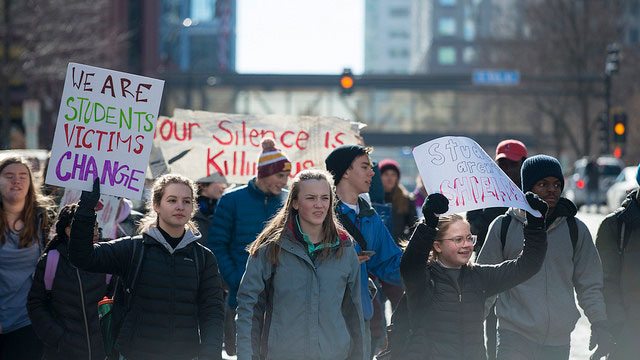
March 10, 2018; Star Tribune
In the wake of the shooting at Marjory Stoneman Douglas high school in Florida and dozens of other shootings around the country, activism among high school and college students has burst onto the public stage. Recognizing that civics education may be lacking in some districts, the ACLU has made a point to educate students about their free speech and protest rights in advance of planned walkouts and other events.
Josh Bell, Media Strategist at the ACLU Center for Democracy, told the University of Connecticut’s Daily Campus in an email, “You have the right to speak out, hand out flyers and petitions and wear expressive clothing in school—as long as you don’t disrupt the functioning of the school or violate the school’s content-neutral policies.”
Students may be disciplined for skipping school, but they cannot be punished more harshly for a walkout than they would be for missing class for any other reason. The ACLU also posted a video of a Know Your Rights training and published articles explaining to students and administrators how to balance compliance and protest.
A nationwide high school walkout is planned in solidarity with the Parkland students on March 14th.
The ACLU is basing many of its recommendations on precedent established during the Vietnam War. In 1969, the Eighth Circuit Court of Appeals in Iowa ruled in Tinker v. Des Moines that “First Amendment rights, applied in light of the special characteristics of the school environment, are available to teachers and students. It can hardly be argued that either students or teachers shed their constitutional rights to freedom of speech or expression at the schoolhouse gate.” That case is being cited frequently by those advising today’s students, drawing a link to another time when student activism was a major political force and reminding students and adults alike that young people are and have been active caretakers of their country’s future.
Sign up for our free newsletters
Subscribe to NPQ's newsletters to have our top stories delivered directly to your inbox.
By signing up, you agree to our privacy policy and terms of use, and to receive messages from NPQ and our partners.
This is an important lesson to drive home, because not all lawmakers recognize the students’ pleas as a legitimate driver of legislative action. Florida State Representative Elizabeth Porter said, “We’ve been told that we need to listen to the children and do what the children ask…Do we allow the children to tell us that we should pass a law that says no homework?…No. The adults make the laws.” Last Wednesday, students staged a sit-in outside Senate Majority Leader Mitch McConnell’s office in the Capitol, but McConnell did not grant them an audience. Eventually, the students were escorted out of the building by capitol police, chanting, “Enough is enough” and “Not one more.”
The ACLU, energized by the enormous influx of cash and membership it experienced last year in the wake of Donald Trump’s election, is actively encouraging students to engage in civic debate. Executive Director Anthony Romero told Salon that his organization plans to be a dominant political force, standing as an equal and opposite actor to organizations like the National Rifle Association, which has not responded productively to the Parkland shooting or protests. ACLU Indiana executive director Jane Henegar wrote, “School administrators: Just because schools are within their rights to discipline students, that doesn’t mean they should….To cultivate informed citizens who care about their communities and speak truth to power, school leaders should take this opportunity to encourage this spirit of activism and civic purpose, not punish it.”
Students have proven themselves to be capable organizers, powerful speakers, and extremely capable users of social media platforms. Combining their determination and emotional presence with the legal savvy and the new spending power of the ACLU has big potential consequences. In the vacuum of leadership on gun safety from NRA-shy politicians, the ACLU’s resources are empowering students to lead the change themselves.
It should be noted that inspiring and laudable movements like this one also serve to highlight racial inequity. Vox writer P.R. Lockhart pointed out,
Organizing around Black Lives Matter and the larger Movement for Black Lives, another youth-led movement demanding policy change in the wake of trauma, was not and has not been as readily embraced…It opens up a complicated discussion about who gets empathy in America, what issues are deemed important, and the types of activism and activists that the public responds to…When highlighting the disparity in public reaction, activists and organizers have noted that their words should not be taken as an attack on the students, but rather as a challenge to how the trauma of certain groups is perceived.
—Erin Rubin












